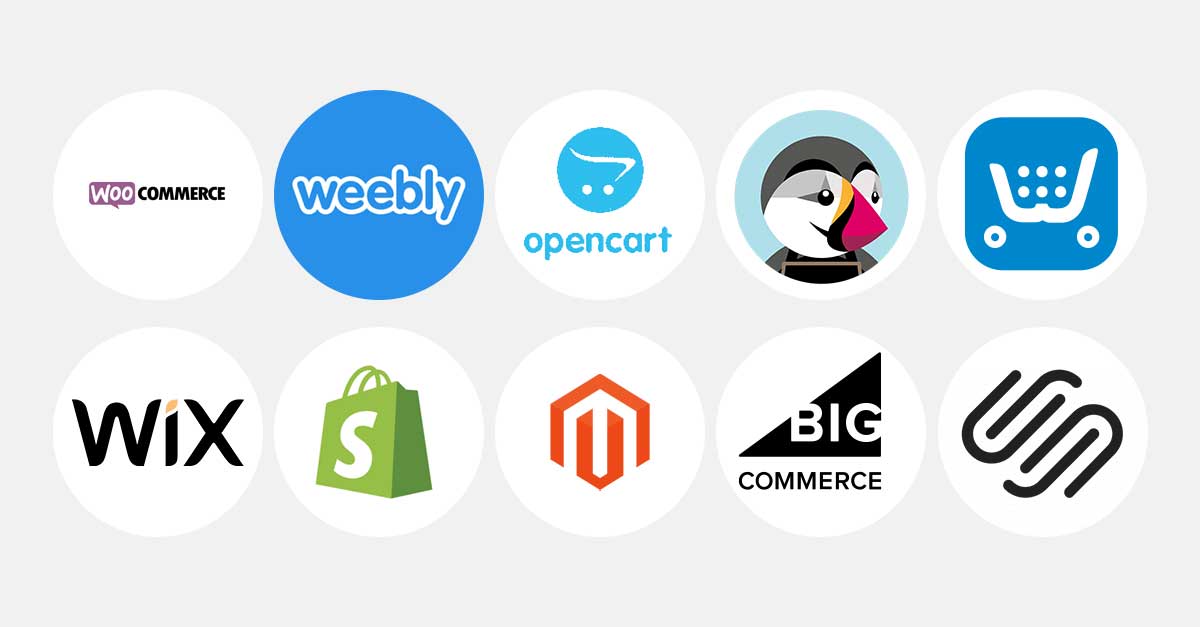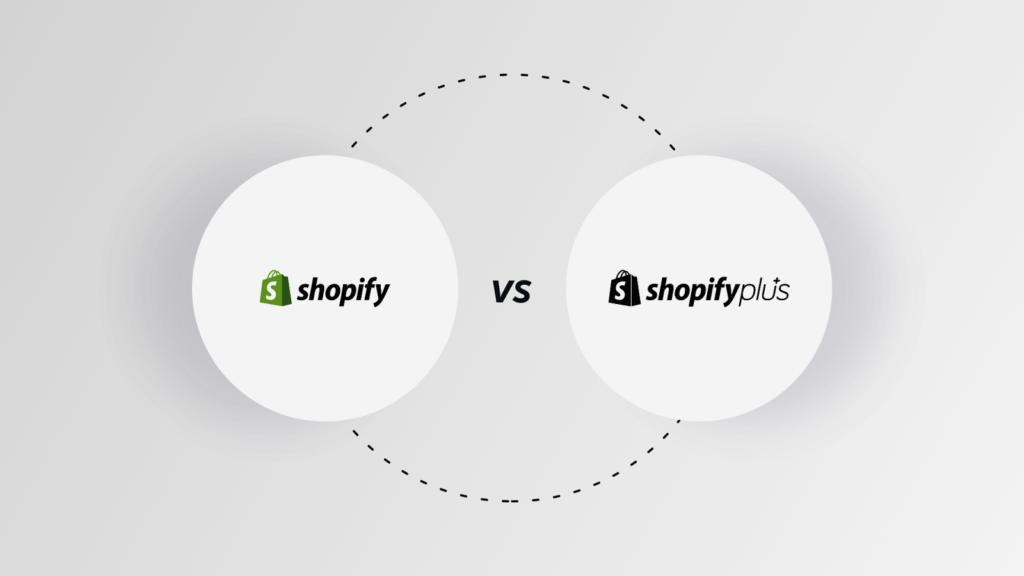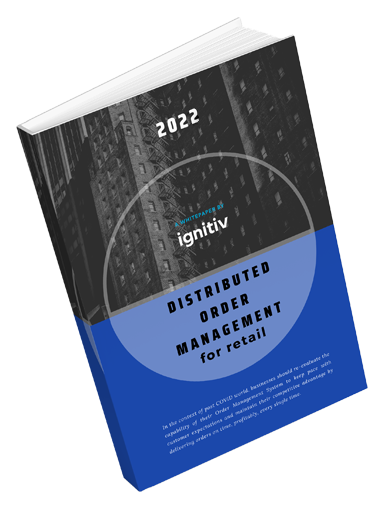Best ecommerce platform
When it comes to enterprise e-commerce solutions, even slight variations in performance, features, customization, and ease of use can make a huge difference. Every e-commerce platform in the market claims to be SEO-optimized, fast, and reliable. But is there any truth to it?
When choosing the best ecommerce platform 2024, you want to make sure your site loads up faster after customization and that the TCO (total cost of ownership) aligns with your budget. The last thing you want is to be stuck with a slow, unreliable eCommerce platform that brutally affects your customer experiences and eventually ROI.
To help you make an informed decision, we have compared the Top 10 Best enterprise eCommerce platforms in 2024 in their performance, features, plugins & integrations, etc. You’ll know which enterprise platforms are ideal for what niche.
Let’s begin with the top e-commerce platforms list:
Top 10 Enterprise eCommerce Platforms
In the dynamic landscape of online retail, selecting the right digital commerce platforms paramount for success. Here’s a curated list of top ecommerce platforms offering comprehensive e-commerce solutions and services to streamline your online business journey. So let’s check the ecommerce platform comparison below.
1. Shopify
Best for Multi-channel selling, All-in-one stores, and Start-ups

Shopify is the best cloud-based (SaaS) enterprise commerce platform and one of the ideal ecommerce solutions for small business and SMEs. businesses can leverage Shopify to set up, design, and manage their online stores across multiple sales touchpoints such as pop-up shops,
social media platforms, mobile, web, marketplaces, etc. yet, merchants can manage everything from a single pane of glass.
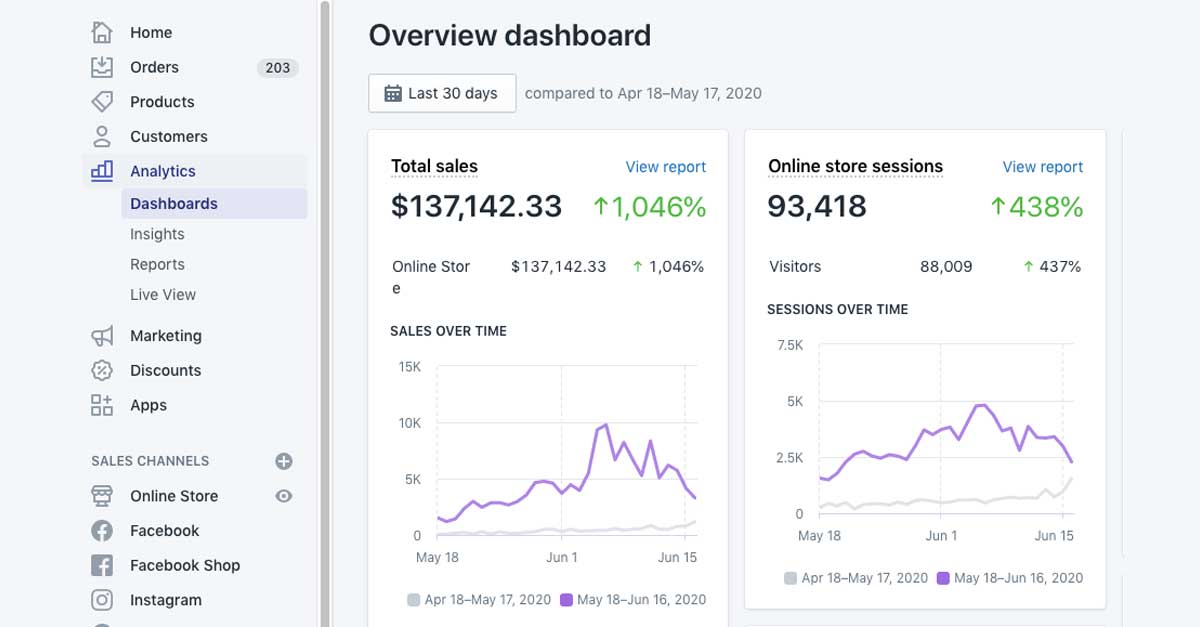
Shopify offers a robust back-office and excellent scalability, making it optimal for businesses of any size. The main highlights of the platform include dropshipping, multi-channel selling, wholesale services, automated marketing, built-in SEO, Shopify apps to incorporate more features, etc.
| Pros | Cons |
|---|---|
| Fast loading times; Easy to use | Poor SEO |
| 1-Click selling apps | Buying Shopify apps can make it expensive |
| Print on Demand integrations | URL structure has limited customization |
| Best small business ecommerce platforms for multi-channel selling | |
| Intuitive drag-and-drop website builder | |
| All-in-one POS system | |
| Multiple certified partners available to help |
Pricing: Paid plans start from $25/month
2. BigCommerce
Best ecommerce platform for large businesses

BigCommerce is one of the prominent leaders in Open SaaS enterprise eCommerce solutions, helping businesses build, manage and scale their e-commerce stores – regardless of the size. It offers exceptional enterprise-grade capabilities, fast performance, and advanced customization with ease of use.
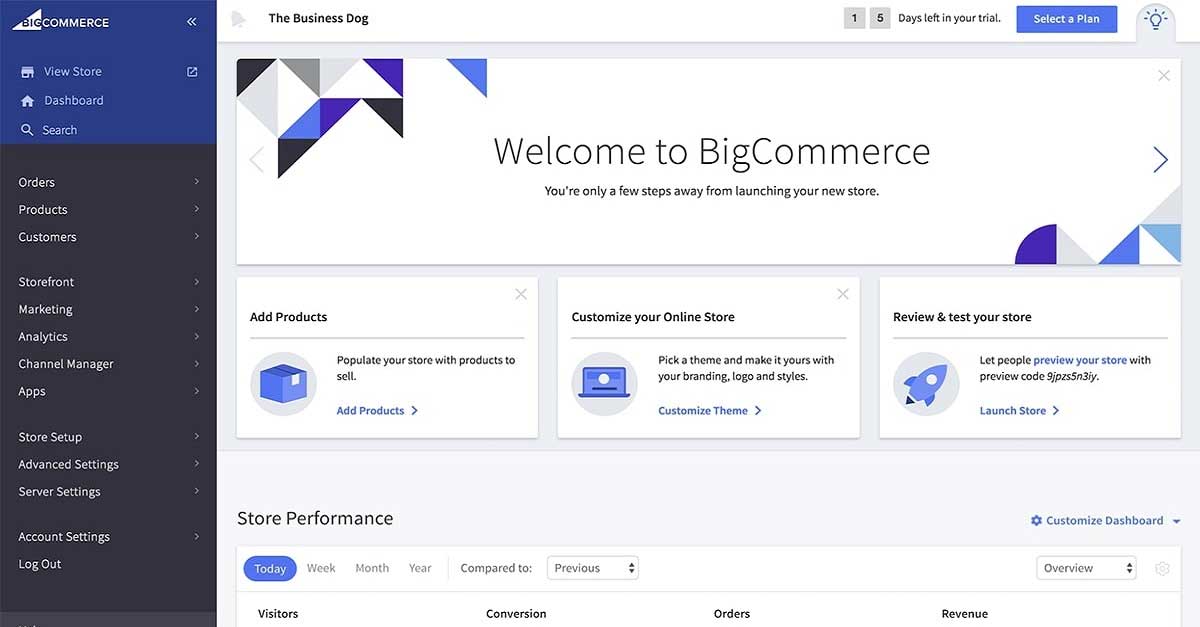
As one of the best B2B eCommerce Platforms in the World, myriads of B2B and B2C enterprises have leveraged BigCommerce to build fast-performing, reliable online stores. These include Skullcandy, Ben & Jerry’s, Ted Baker, SoloStove, Burrow, MitoQ, and more. It has a large app marketplace with numerous free apps to extend the functionality of your e-store.
BigCommerce enterprise is ideal for multi-storefronts, enterprise B2B, and B2C companies as it supports Omni channel and Commerce-as-a-Service functionality. It has Open SDKs, APIs, and data, making it highly flexible for customization. The best thing is that it also offers headless commerce and composable architecture integrations.
| Pros | Cons |
|---|---|
| API-enabled high flexibility and scalability | It can be expensive for high-volume businesses |
| Headless-ready unified eCommerce platform | No 1-click upselling/selling |
| Strong SEO performance | |
| Best for multi-channel selling and order management | |
| Robust back-office integrations | |
| Abandoned cart saver |
Pricing: Plans start at $29/month
3. Wix
Best ecommerce solution for small business

Wix has earned a good reputation in the e-commerce industry within a short period of time, all because of the excellent value it offers for solo merchants and small stores. With its robust features and scalability, Wix is one of the top enterprise ecommerce platforms in the market.
Wix is a website builder that offers dropship, multi-channel integration, print-on-demand capabilities, abandoned cart recovery, own Wix App Market, and much more. Merchants can integrate these apps with their stores to add more features such as marketing, design elements, media, content, events, blogging, live chat, booking appointments, and so on.
| Pros | Cons |
|---|---|
| Beginner-friendly | Poor SEO |
| 900+ free, customizable website templates | Lacks advanced automation and upselling features |
| Easy drag-and-drop builder | Limited customization for templates |
| Email campaigns | |
| AI-driven FB and IG ads |
Pricing: Paid plans start at $24/month
4. WooCommerce
Best for SEO, Content-driven Businesses

WooCommerce is a very popular enterprise eCommerce platform. It offers power-packed features, and seamlessly integrates with your self-hosted WordPress website, giving you the power of customization. Hence, you get to run affiliate and eCommerce websites under one umbrella.
It offers various integrations for payment gateways, 1-click selling, email marketing automation, social media, shipping, Amazon checkout, print-on-demand, Amazon 2-way sync, eBay 2-way sync, and so much more. There are some paid integrations available as well, such as dropshipping and Amazon FBA.
WooCommerce is perfect for those who are familiar with WordPress already. For others, there’s a slight learning curve involved.
| Pros | Cons |
|---|---|
| Powerful CMS | Poor scalability |
| Best platform for SEO performance | Those who aren’t familiar with WordPress may struggle with setup, plugins, hosting, buying domain names and other technical factors |
| 1-click selling features | Hosting can be expensive |
| Highly customizable and Open-source | Needs extensions for even simple features |
| Numerous integrations available | Lacks PCI compliance |
| Integrates with WooCommerce Payments, PayPal, Stripe, Square, Amazon Pay, etc. | |
| Best for those with WordPress sites who want to start selling | |
| WordPress community developers and experts available to help |
Pricing: Free. Paid extensions are available.
5. Magento (Now Adobe Commerce)
Best for Multi-Channel Commerce
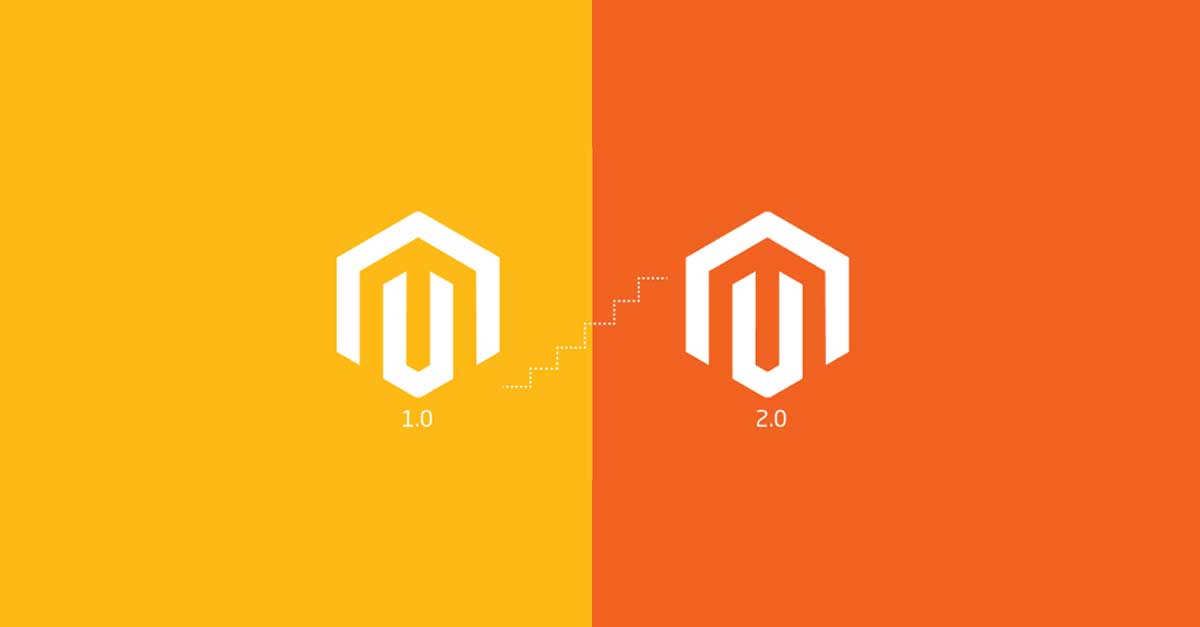
Adobe Commerce (previously known as Magento) boasts advanced data sharing and AI capabilities, delivering B2C and B2B eCommerce personalization. It allows you to manage multiple brands, and channels, and extend your store to new locations, all via a single platform.
It offers robust features such as page builder, AI-driven product recommendations, inventory fulfillment, data analysis, reporting, unlimited payment processing, automated trigger-based email campaigns, and more. Abode Commerce is the best e commerce platforms for those seeking powerful features and advanced customization.
| Pros | Cons |
|---|---|
| Host multiple cloud deployments and instances on a single platform | Very expensive |
| Flexible, scalable and headless-ready | Requires advanced coding knowledge and developer skills |
| Powered by Adobe Sensei AI | Needs enough space and memory for fast performance; or else may slow down |
| Seamlessly integrates with Adobe products like Creative Cloud, Experience Manager, Target, Analytics, etc. | Themes may be costly |
| 1-click selling | |
| Automated cross-sell and upsell | |
| Strong SEO performance | |
| A large community of developers |
Pricing: Custom quote
6. Squarespace
Best for Creative Companies and Artists

Squarespace is popular enterprise eCommerce software that helps you build your site with little to no coding skills. It is one of the best ecommerce platforms for small business and beginners looking for a simple, budget-friendly yet feature-rich platform offering trendy and modern templates. With Squarespace, you will be able to create aesthetically pleasing websites and add more functionality via extensions.
Squarespace’s Unfold app will help you create professional-looking content for your social media channels.
| Pros | Cons |
|---|---|
| Extensive templates | Integrates with just a few third-party apps |
| Built-in mobile websites | Limited payment integrations (only Stripe and PayPal) |
| Built-in SEO tools | No drop shipping |
| Squarespace Apps to add more functionality | Set up takes time and patience |
| Advanced analytics | Does not have its own app marketplace |
| Robust Scheduling feature | Lacks marketing automation |
| Best for service providers that take paid bookings (stylists, technicians, therapists, consultants, etc.) | |
| Automated inventory management |
Pricing: Paid plans start at $16/month
7. Ecwid
Best Free Platform
Ecwid is a cloud-based ecommerce provider. It offers a free-forever enterprise eCommerce platform with limited functionalities, making it one of the feasible e-commerce solutions for small business. For advanced features, you need to upgrade to the paid plans.
Ecwid’s enterprise eCommerce platform comes with limited functionalities so for advanced features, you need to upgrade to the paid plans.
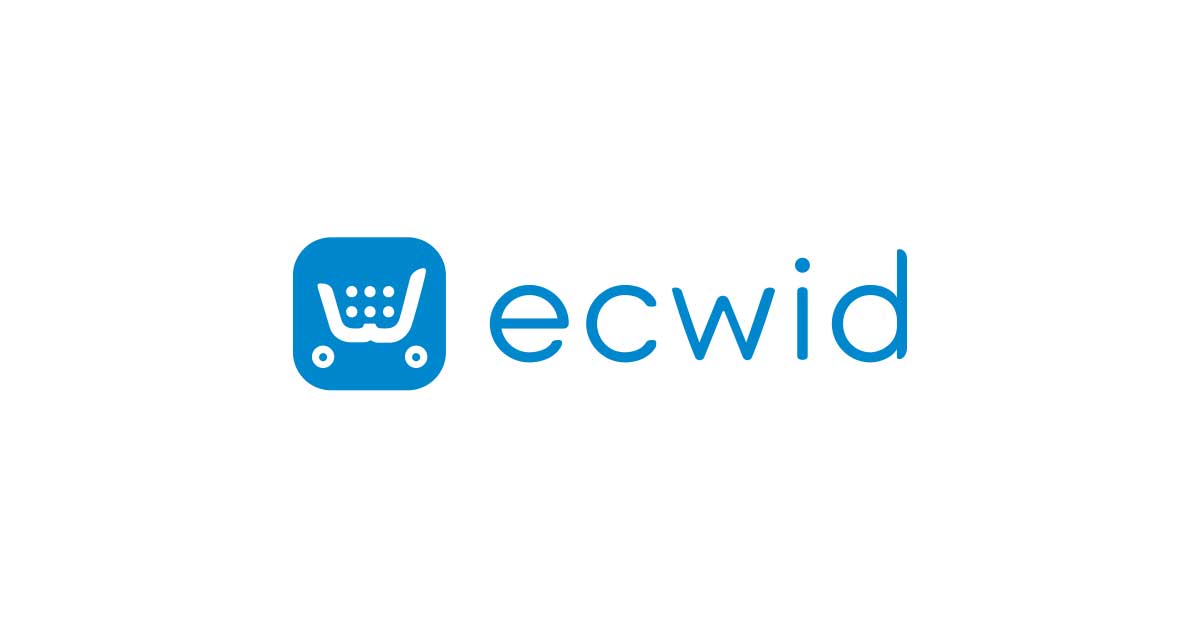
With Ecwid, you can sell anywhere – be it on social media, website, live in-person, or marketplaces like Amazon and eBay via integrations. It also offers marketing tools for Facebook and Google Ads to boost business growth.
The social selling capability of the enterprise platforms allows you to add and sell products on Instagram and Facebook feeds. Merchants can accept payments with Square or other POS systems. Lastly, it automatically updates your inventory levels for optimal store management.
| Pros | Cons |
|---|---|
| 70+ Payment Gateways | The free plan only supports 5 products; Does not support the selling of digital products |
| Supports 50 languages | Lacks SEO features |
| Automated Google Shopping Ads | Poor support |
| Create Facebook Ad campaigns in minutes | Set up takes time and patience |
| Unified inventory and order management | Does not have its own app marketplace |
| Live support | Lacks marketing automation |
| Ecwid App Store has numerous apps and tools | |
| Ecwid Mobile App available |
8. PrestaShop
Best Alternative to WooCommerce
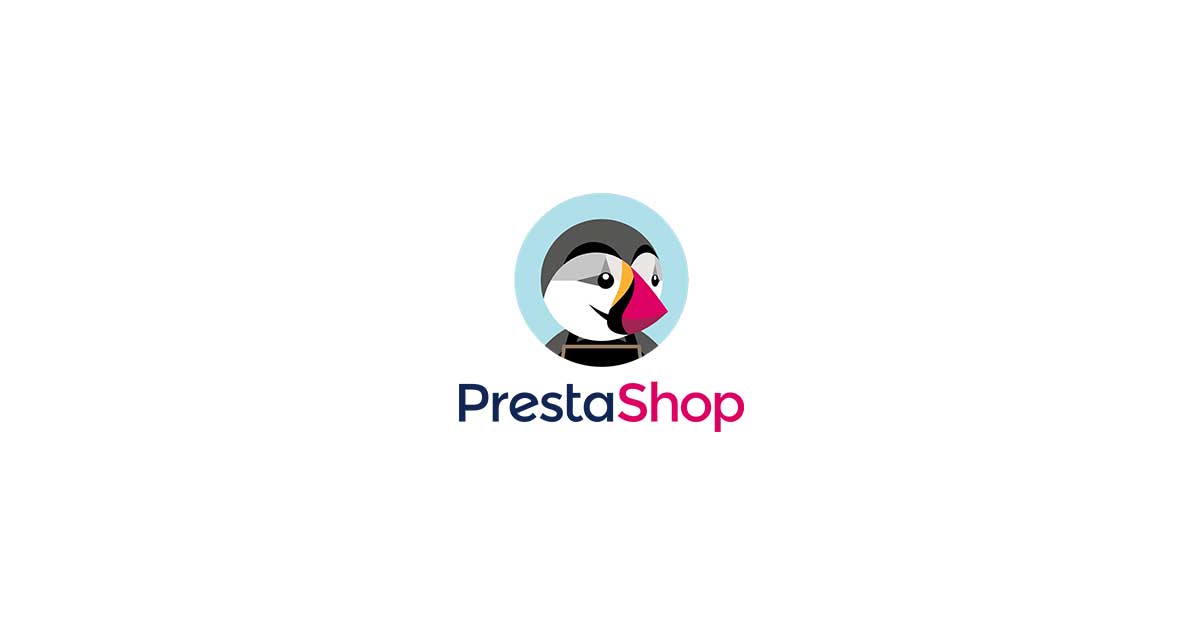
PrestaShop is an open-source enterprise eCommerce provider that offers high flexibility and customization, just like WooCommerce. The developers can easily edit the code to design the templates and create custom modules.
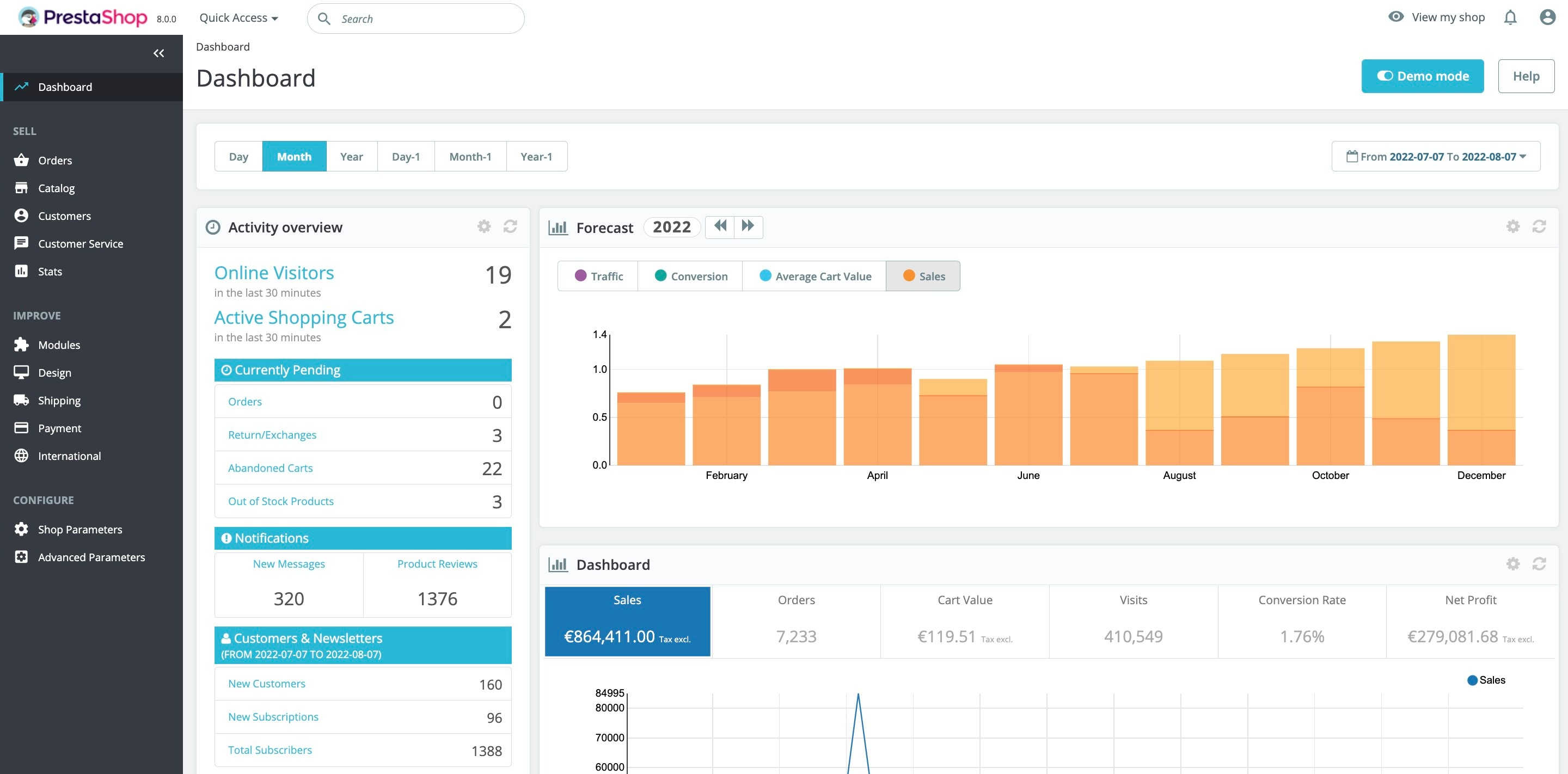
With the page builder, you can customize the site’s hooks and pages. In the PrestaShop Modules Marketplace, you can find the best module for your online store. Further, it offers PrestaShop Checkout and Paylater to process personalized and secure payments.
It is open-source, but the platform offers a fully-managed PrestaShop Hosting option as well. For additional assistance, you can get help from PrestaShop Experts. PrestaShop is suitable for eCommerce stores seeking advanced checkout and product management features.
| Pros | Cons |
|---|---|
| Best ecommerce platform for custom products and advanced customization | The page builder is not visual; hence you won’t get to see real-time changes |
| 6000+ templates, and modules available | Limited free add-ons |
| Numerous integrations available | Limited support. You need to pay for Dedicated Support. |
| Caching integration available | Set up takes time and patience |
| 6 POS channels are available | |
| One-page checkout | |
| Best for those looking for a good WooCommerce alternative |
Pricing: Free. You need to buy a hosting plan and domain. Paid extensions are available.
9. OpenCart
Budget-friendly
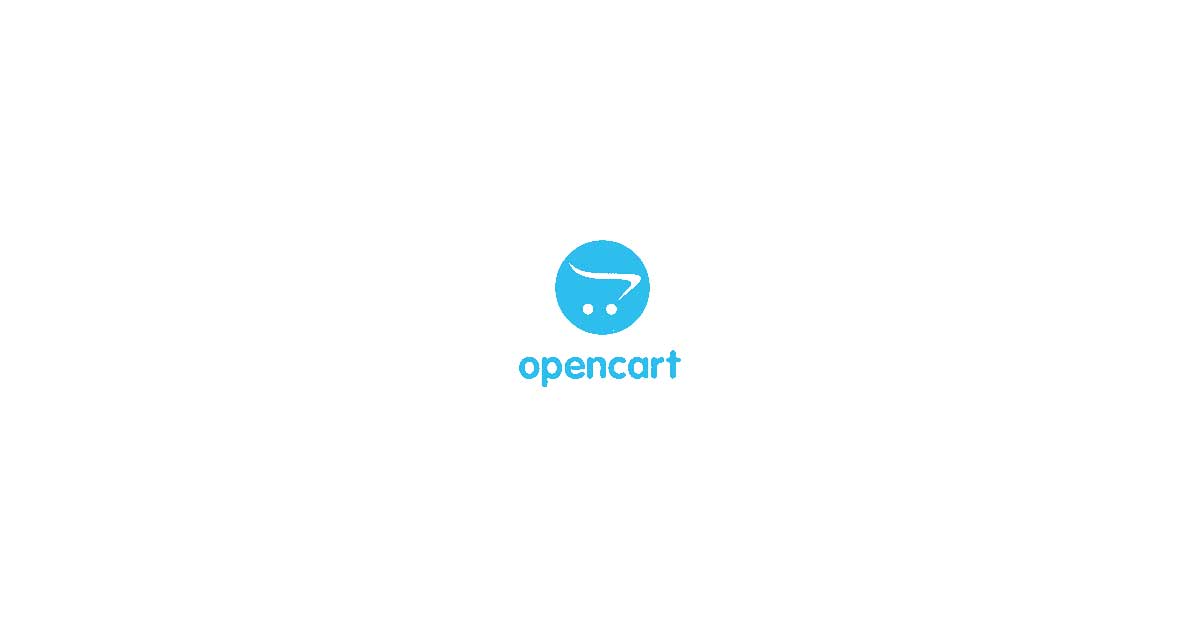
OpenCart is a free enterprise eCommerce platform that offers advanced customization capability. The platform is a breeze to set up and allows you to build and manage multiple storefronts. Simply install OpenCart, select the template, and add your products!
Within a unified dashboard, merchants can keep track of sales, orders, customers, who are online, sales analytics, and many other widgets. OpenCart is best suited for online stores of any budget, size, and niche.
| Pros | Cons |
|---|---|
| Built-in SEO | Limited features in the free plan |
| 13000+ themes and modules | Self-hosting can get expensive |
| Dedicated commercial support. Free community support | Lacks marketing and sales features |
| Payment gateways integrations | Has module system; No drag and drop builder |
| Access control and user privileges | |
| Mobile-friendly admin dashboard | |
| Highly customizable |
Pricing: Free. Paid add-ons are available.
10. Weebly
Best for Beginners

Weebly is an e-commerce service, ideal for start-ups to grow their business with minimal hassle. It offers powerful SEO tools, a drag-and-drop builder, mobile-friendly site, along with integrated marketing and advanced analytics.
The platform aims to simplify inventory management, shipping, and taxes for businesses. And since Weebly is one of Square’s Commerce offerings, you can easily sell in-person as well. Weebly is perfect for small online stores as it does not require technical expertise or a complex setup.
| Pros | Cons |
|---|---|
| Robust drag and drop builder | Limited customization |
| Mobile-responsive website design | Slow processing |
| Free Themes available | |
| Payment gateway integrations with PayPal, Stripe, and Square | |
| Easy setup | |
| Beginner-friendly; requires less technical expertise |
Pricing: Free. Paid plans are available.
Frequently Asked Questions
The cost of building an e-commerce website may vary as per features, development, design, complexity of setup, and more. A basic website can cost anywhere from $500 and go up to $5000 as per add-ons. Complex websites can go above $15000 due to advanced integrations and features.
When selecting your best enterprise eCommerce platform, look for factors such as ease of use, setup, features, freedom of customization, flexibility, integrations, themes/templates, security, customer support, payment/shipping options, pricing plans, and most importantly scalability.
Many e-commerce platforms support the selling of physical as well as digital products such as eBooks, courses, software, services, etc. These solutions offer unique capabilities to manage digital product fulfillment, along with secure hosting and delivery options.
Some examples of popular enterprise e-commerce platforms include Magento Commerce, Shopify Plus, BigCommerce Enterprise, WordPress, and OperCart.
The best e-commerce platform varies depending on the specific requirements of your business, such as size, scalability, customization, integration options, budget, and technical expertise. Some popular e-commerce platforms include Shopify, WooCommerce, Magento, and BigCommerce. Always consider your business needs and compare features before selecting the most suitable platform.
Shopify and Magento are considered the safest e-commerce platform. Shopify is renowned for its adherence to PCI DSS (Payment Card Industry Data Security Standard) compliance to ensure the secure handling of credit card information. Similarly, Magento Commerce offers extensive security features, regular security updates, and options for implementing additional security measures through extensions and configurations.
eCommerce, like any online activity involving financial transactions, comes with inherent risks. However, whether to consider it as “high-risk” depends on various factors such as the industry you operate in, the nature of your products or services, and your payment processing methods. If your business deals with high-value transactions, international sales, or recurring billing models, it may be deemed a higher risk by payment processors. However, implementing robust security measures, fraud detection systems, and adhering to compliance standards can help mitigate these risks.
Conclusion
Hope the above enterprise ecommerce platforms list will help you make the right decision for choosing the right ecommerce platform. Every enterprise eCommerce solution is built differently, making it ideal for specific e-commerce businesses. Depending upon the features, product type, target audience, business goals, and other factors, merchants can choose the platform that best suits their requirements.
Ignitiv is a prominent customer experience company aiming to help businesses build successful, feature-rich commerce solutions. The main focus of Ignitiv is to cater to customers’ needs and help them build and manage scalable, feature-rich, and innovative e-commerce solutions that are hyper-personalized and custom-made. We bring forth an AI-driven approach, technology, design, and strategic plan to aid this mission. With our Integrated Ecommerce Solutions, we provide an end-to-end customized commerce experience.
